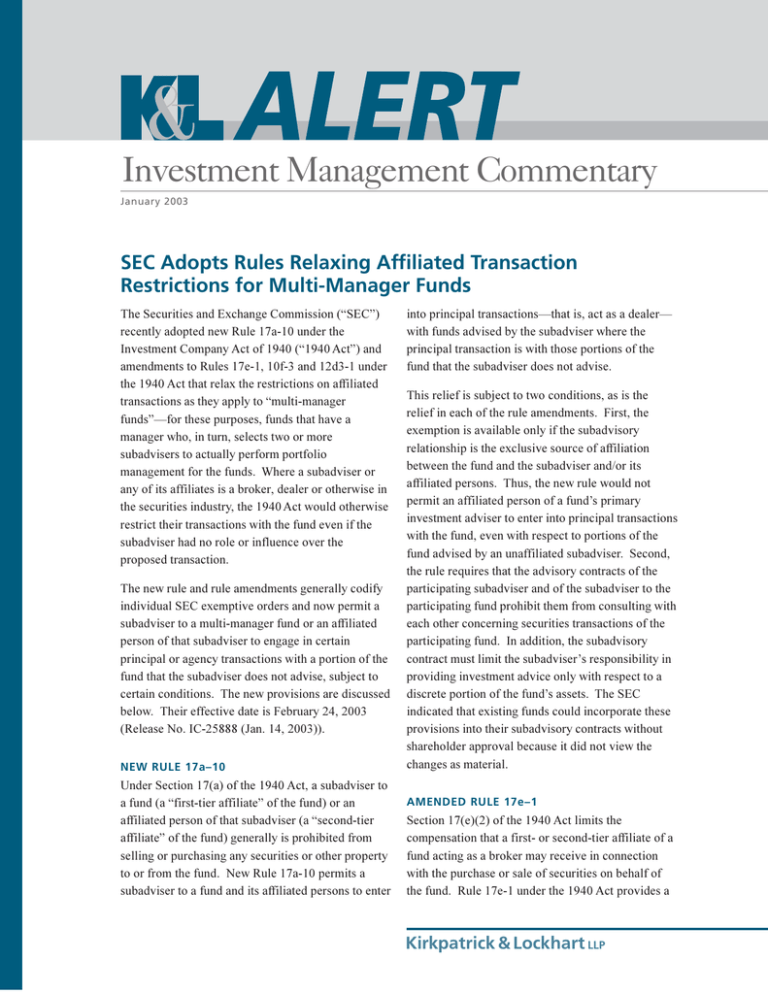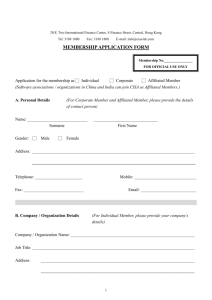
Investment Management Commentary
January 2003
SEC Adopts Rules Relaxing Affiliated Transaction
Restrictions for Multi-Manager Funds
The Securities and Exchange Commission (SEC)
recently adopted new Rule 17a-10 under the
Investment Company Act of 1940 (1940 Act) and
amendments to Rules 17e-1, 10f-3 and 12d3-1 under
the 1940 Act that relax the restrictions on affiliated
transactions as they apply to multi-manager
fundsfor these purposes, funds that have a
manager who, in turn, selects two or more
subadvisers to actually perform portfolio
management for the funds. Where a subadviser or
any of its affiliates is a broker, dealer or otherwise in
the securities industry, the 1940 Act would otherwise
restrict their transactions with the fund even if the
subadviser had no role or influence over the
proposed transaction.
The new rule and rule amendments generally codify
individual SEC exemptive orders and now permit a
subadviser to a multi-manager fund or an affiliated
person of that subadviser to engage in certain
principal or agency transactions with a portion of the
fund that the subadviser does not advise, subject to
certain conditions. The new provisions are discussed
below. Their effective date is February 24, 2003
(Release No. IC-25888 (Jan. 14, 2003)).
NEW RULE 17a–10
Under Section 17(a) of the 1940 Act, a subadviser to
a fund (a first-tier affiliate of the fund) or an
affiliated person of that subadviser (a second-tier
affiliate of the fund) generally is prohibited from
selling or purchasing any securities or other property
to or from the fund. New Rule 17a-10 permits a
subadviser to a fund and its affiliated persons to enter
into principal transactionsthat is, act as a dealer
with funds advised by the subadviser where the
principal transaction is with those portions of the
fund that the subadviser does not advise.
This relief is subject to two conditions, as is the
relief in each of the rule amendments. First, the
exemption is available only if the subadvisory
relationship is the exclusive source of affiliation
between the fund and the subadviser and/or its
affiliated persons. Thus, the new rule would not
permit an affiliated person of a funds primary
investment adviser to enter into principal transactions
with the fund, even with respect to portions of the
fund advised by an unaffiliated subadviser. Second,
the rule requires that the advisory contracts of the
participating subadviser and of the subadviser to the
participating fund prohibit them from consulting with
each other concerning securities transactions of the
participating fund. In addition, the subadvisory
contract must limit the subadvisers responsibility in
providing investment advice only with respect to a
discrete portion of the funds assets. The SEC
indicated that existing funds could incorporate these
provisions into their subadvisory contracts without
shareholder approval because it did not view the
changes as material.
AMENDED RULE 17e–1
Section 17(e)(2) of the 1940 Act limits the
compensation that a first- or second-tier affiliate of a
fund acting as a broker may receive in connection
with the purchase or sale of securities on behalf of
the fund. Rule 17e-1 under the 1940 Act provides a
Kirkpatrick & Lockhart LLP
safe harbor as to when compensation received by an
affiliated person of a fund qualifies as the usual and
customary brokers commission. The rule, among
other things, requires a funds board to review
transactions effected pursuant to the rule to
determine whether the transactions comply with the
rule. The rule also requires funds to maintain certain
records of such transactions and of the boards
review.
Amended Rule 17e-1 permits an affiliated subadviser
(or an affiliated person of that subadviser) of a fund
to receive compensation for service as a broker
without complying with the board review and record
keeping requirements of the rule. Nevertheless, the
affiliated broker itself is still required to charge no
more than its usual and customary brokerage
commissions on such transactions. This relief is
subject to the same conditions described above with
respect to new Rule 17a-10.
AMENDED RULE 10f–3
Section 10(f) of the 1940 Act prohibits a fund from
acquiring any security during the existence of an
underwriting syndicate where a principal underwriter
of that security is, among other persons, an
investment adviser of the fund or an affiliated person
of an investment adviser of the fund. Prior to the
adoption of amended Rule 10f-3, a fund was subject
to Section 10(f)s prohibition when any of its
advisers or subadvisers or their affiliated persons
participated in the underwriting syndicate regardless
of whether the adviser or subadviser recommending
or directing the purchase was a participant or an
affiliate of a participant in the underwriting
syndicate. Amended Rule 10f-3 limits the scope of
Section 10(f) so that the subadviser of one portion of
a fund can purchase securities in an offering where
the subadviser to a second portion of the fund is a
member, or affiliated with a member, of the
underwriting syndicate, provided that the purchasing
subadvisers advisory contract contains the
provisions required by new Rule 17a-10.
Section 10(f) and Rule 10f-3 would continue to apply
to purchases by a portion of a fund in an offering that
is underwritten by the subadviser (or an affiliate
thereof) to the portion of the fund making the
purchase. However, the SEC relaxed the 25% limit
on aggregate purchases made pursuant to the rule by
permitting a portion of a fund to exclude purchases
by other portions of the same fund that are advised
by different subadvisers for purposes of determining
compliance with the rules limit on aggregate
purchases.
AMENDED RULE 12d3–1
Section 12(d)(3) of the 1940 Act generally prohibits
funds from purchasing securities issued by a
registered investment adviser, broker, dealer or
underwriter (securities-related businesses). Rule
12d3-1 provides an exemption from Section 12(d)(3)
and permits a fund to invest up to 5% of its assets in
equity securities of an issuer deriving more than 15%
of its gross revenues from securities-related
businesses. However, a fund may not rely on the rule
to purchase securities of any of its own investment
advisers or their affiliated persons.
Amended Rule 12d3-1 permits a portion of a multimanager fund to purchase securities issued by a
subadviser to another portion of the same fund or an
affiliated person of that subadviser. These purchases
are subject to the same conditions that apply under
new Rule 17a-10. In addition, the percentage
ownership limits in Rule 12d3-1 continue to apply to
the fund as a whole. Accordingly, multi-manager
funds must monitor compliance with these limits on a
fund-wide basis.
SERIES FUNDS ADVISED BY SUBADVISERS
The relief described above also would be available to
a subadviser that is itself a broker-dealer seeking to
enter into transactions with a fund that is affiliated
with the fund that the subadviser advises (e.g., other
funds in the same fund complex). In particular, the
rules would permit the subadviser to enter into
principal and agency transactions with other funds in
the same fund complex, subject to the same
conditions that apply under new Rule 17a-10. In
addition, the rules also would codify SEC staff noaction positions providing that Section 10(f) does not
apply to a funds purchase of securities in an
underwriting in which a subadviser (or an affiliate
thereof) to another series of the same investment
company is a participant.
Kirkpatrick & Lockhart LLP
2
Additional Note: SEC Adopts Amendment
to Rule 10f–3 Applicable to All Funds
Separately, the SEC adopted an additional
amendment to Rule 10f-3 to tighten the rules
restriction on aggregate purchases made pursuant to
the rule. The amended rule will require all funds to
include both purchases by registered funds that are
advised by the same adviser that is a participant (or
whose affiliate is a participant) in the underwriting
or selling syndicate and all private accounts over
which the adviser has investment discretion when
determining compliance with the rules limit on
aggregate purchases.
The SEC delayed the compliance date for the
amendments to Rule 10f-3 until April 23, 2003.
After that date, a fund must comply with all of the
conditions of the rule. A fund that purchases
securities between February 24, 2003 and April 23,
2003 may rely on either Rule 10f-3 as amended or
Rule 10f-3 as it existed prior to these amendments.
ARTHUR BROWN
202.778.9046
abrown@kl.com
MARK C. AMOROSI
202.778.9351
mamorosi@kl.com
Kirkpatrick & Lockhart LLP
3
Kirkpatrick & Lockhart LLP maintains one of the leading investment management practices in the United States,
with over 60 lawyers devoting all or a substantial portion of their practice to this area. According to the April 2002
American Lawyer, K&L is a mutual funds powerhouse that represents more of the largest 25 investment company
complexes and their affiliates than any other law firm.
We represent mutual funds, insurance companies, broker-dealers, investment advisers, retirement plans, banks and
trust companies, private funds, offshore funds and other financial institutions. We also regularly represent mutual
fund distributors, independent directors of investment companies, retirement plans and service providers to the
investment management industry. In addition, we frequently serve as outside counsel to industry associations on a
variety of projects, including legislative and policy matters.
We work with clients in connection with the full range of investment company industry products and activities,
including all types of open-end and closed-end investment companies, funds of hedge funds, variable insurance
products, private and offshore investment funds and unit investment trusts. Our practice involves all aspects of the
investment company business: from organizing and registering open-end and closed-end funds, both as series and
individual portfolios, to providing ongoing advice and representation to the funds and their advisers, directors and
distributors.
We invite you to contact one of the members of our investment management practice, listed below, for additional
assistance. You may also visit our website at www.kl.com for more information, or send general inquiries via email
to investmentmanagement@kl.com.
BOSTON
Michael S. Caccese
Philip J. Fina
Mark P. Goshko
Thomas Hickey III
Nicholas Hodge
617.261.3133
617.261.3156
617.261.3163
617.261.3208
617.261.3210
mcaccese@kl.com
pfina@kl.com
mgoshko@kl.com
thickey@kl.com
nhodge@kl.com
LOS ANGELES
William P. Wade
310.552.5071
wwade@kl.com
NEW YORK
Beth R. Kramer
Richard D. Marshall
Robert M. McLaughlin
Loren Schechter
212.536.4024
212.536.3941
212.536.3924
212.536.4008
bkramer@kl.com
rmarshall@kl.com
rmclaughlin@kl.com
lschechter@kl.com
SAN FRANCISCO
Eilleen M. Clavere
David Mishel
Mark D. Perlow
Richard M. Phillips
415.249.1047
415.249.1015
415.249.1070
415.249.1010
eclavere@kl.com
dmishel@kl.com
mperlow@kl.com
rphillips@kl.com
WASHINGTON
Clifford J. Alexander
Diane E. Ambler
Catherine S. Bardsley
Arthur J. Brown
Arthur C. Delibert
Robert C. Hacker
Benjamin J. Haskin
Kathy Kresch Ingber
Rebecca H. Laird
Thomas M. Leahey
Cary J. Meer
R. Charles Miller
Dean E. Miller
R. Darrell Mounts
C. Dirk Peterson
Alan C. Porter
Theodore L. Press
Robert H. Rosenblum
William A. Schmidt
Lynn A. Schweinfurth
Donald W. Smith
Robert A. Wittie
Robert J. Zutz
202.778.9068
202.778.9886
202.778.9289
202.778.9046
202.778.9042
202.778.9016
202.778.9369
202.778.9015
202.778.9038
202.778.9082
202.778.9107
202.778.9372
202.778.9371
202.778.9298
202.778.9324
202.778.9186
202.778.9025
202.778.9464
202.778.9373
202.778.9876
202.778.9079
202.778.9066
202.778.9059
calexander@kl.com
dambler@kl.com
cbardsley@kl.com
abrown@kl.com
adelibert@kl.com
rhacker@kl.com
bhaskin@kl.com
kingber@kl.com
rlaird@kl.com
tleahey@kl.com
cmeer@kl.com
cmiller@kl.com
dmiller@kl.com
dmounts@kl.com
dpeterson@kl.com
aporter@kl.com
tpress@kl.com
rrosenblum@kl.com
william.schmidt@kl.com
lschweinfurth@kl.com
dsmith@kl.com
rwittie@kl.com
rzutz@kl.com
®
Kirkpatrick & Lockhart LLP
®
Challenge us.
www.kl.com
BOSTON
n
DALLAS
n
HARRISBURG
n
LOS ANGELES
n
MIAMI
n
NEWARK
n
NEW YORK
n
PITTSBURGH
n
SAN FRANCISCO
n
WASHINGTON
............................................................................................................................................................
This publication/newsletter is for informational purposes and does not contain or convey legal advice. The information herein
should not be used or relied upon in regard to any particular facts or circumstances without first consulting a lawyer.
© 2003 KIRKPATRICK & LOCKHART LLP.
ALL RIGHTS RESERVED.

